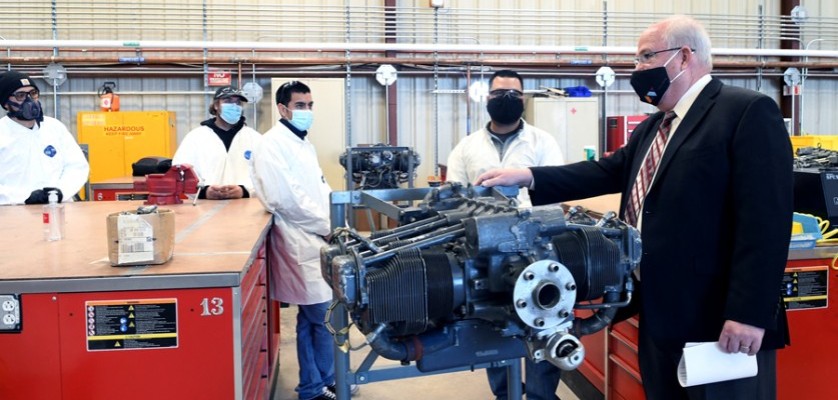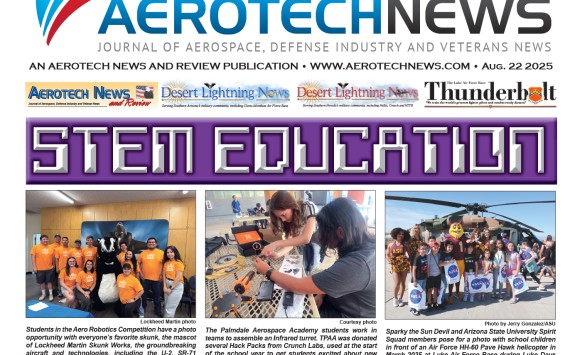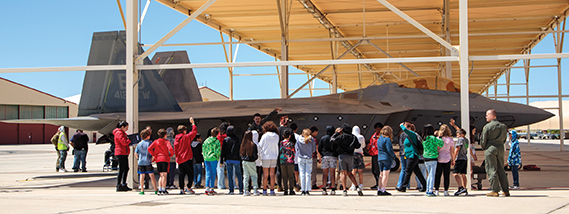LANCASTER, Calif.— Southern California’s Aerospace Valley, a region best known for building aerospace vehicles, is also a significant and rapidly growing force in building the skills of the builders.
Even as the state’s technical industries entered a third year of skilled workforce shortages, lights are on, doors open and classrooms and workshops humming at Antelope Valley Community College, the pipeline between technology employers and people qualified and certified to do the work.
This is not another “gee-whiz report about a miraculous crash program.” It’s just local history with some national implications from high-level state and federal recognition of successful innovation arising from a community college.
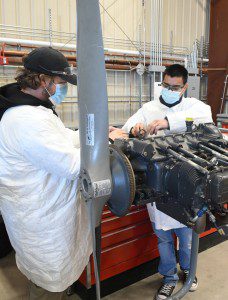
Twenty years after the vocational seed was planted, the college’s home-grown Aircraft Fabrication and Assembly (AFAB); Aeronautical and Aviation Technology (AERO), and Airframe Manufacturing Technology programs under the Aeronautical Sciences & Technology Department now consistently enroll an average between 300 to 400 students in a range of programs running from weeks-long job certifications to two-year AA degrees and bachelors’ degrees.
At the heart of the carrier prep training is the leased Aeronautical Technology Center’s hands-on and runway-accessible facility at Gen. William J. Fox County Airfield in Lancaster. The site is comprised of a 10,000-square-foot hangar, composites lab, computer lab, classrooms and offices. And the Fox Field site works in partnership with technical education classrooms and labs on both the Lancaster and Palmdale campuses.
Students are taught by five full-time instructors, more than 20 adjuncts and up to two instructional assistants.
Interim Dean of Career Technical Education Maria Clinton, Ed.D, reports the AVC Aeronautical and Aviation Technology (AERO) program, a two-year Federal Aviation Administration-approved AA degree for students seeking to work on U.S.-registered aircraft anywhere in the world, began in 1991.
Across the full range of AVC’s aeronautical career education programs, students have gone on to become supervisors, managers and directors earning six-figure incomes after taking either Airframe & Powerplant or Aircraft Fabrication and Assembly Certificate programs.
In addition, AVC is one of only a few community colleges in the United States offering composites fabrication and repair through an eight-week program in Aircraft Fabrication and Assembly (AFAB).
The AFAB allows students to interview with aerospace companies Northrop Grumman, Lockheed Martin and others, immediately earning more than $25 per hour.
For those looking to complete a four-year degree, AVC offers an Airframe Manufacturing Technology bachelor’s degree program created by the regional aerospace industry to encourage students to join the ranks of manufacturer and production-line engineers.
Clinton says the AVC Aeronautical Careers Technology programs boast more than 2,000 graduates in four years with 94 percent job placement in new careers with opportunities for upward mobility and financial stability. The certificate is credit- bearing and works with two-and four-year academic programs.
“Our students reflect a broad range of backgrounds, ethnicities, and genders. In recent years, we have seen more women joining the aviation ranks,” Clinton continued. “Many students enroll directly from high school. Others come out of homelessness, and some are coming back to school for a change in career.
“Some students drive an hour-and-a-half from L.A. to get to class,” he said. “I had one student from Tehachapi who rode a bus, arriving (on campus) at 5 a.m. for an 8 o’clock class. In the winter months, I’d go in early just to let him keep warm in the classroom.”
She adds, “It’s amazing to see the progress and dynamic, positive effect that these programs can have on a student’s life and future — and during times of financial uncertainty like this, this is more needed than ever.”
Asked about memorable success stories, Clinton reports some graduates also became expert adjunct faculty for the Aeronautical Sciences & Technology Department, teaching classes they attended as students.
One of those students, Marlene Ruvalcaba, a former USC pre-law student, saw a news report and thought, “I had no experience with aerospace or aviation and didn’t even know the program existed, but it looked intriguing,” Ruvalcaba recalled in an AVC article. Enrolling in June of 2016, she studied for one semester and four classes before receiving three job offers. Working full time as a composite technician for The Spaceship Company, while simultaneously stayed in school to earn an associate degree and continuing with the first cohort of students in AVC’s groundbreaking Aircraft Manufacturing Technology Bachelor of Science degree program.
Now a quality engineer with The Spaceship Company, she also serves as an AVC adjunct instructor.
Clinton remarks, “Support of the (AVC) district and the Chancellor’s Office award-winning Strong Workforce Program Funding Dollars, are having an effect in putting people to work. The Aircraft Fabrication & Assembly track is among the most effective career training programs in the state based on data showing that virtually every student earning a degree or certificate was employed in a job similar to their field of study and saw a nearly doubling in wages. Strong Workforce funding has allowed Antelope Valley College to accommodate growing enrollment by building additional composite and structure labs, purchase new equipment, and improve an array of program facilities.
“Without the support of the district and Strong Workforce dollars, programs like this would not be able to meet industry demands,” said Clinton, former department chair and current Interim Dean of Career Education. “The industry is hiring and we’re providing them with skilled students who are job ready.”
The Aeronautical Sciences & Technology Program comprises Aircraft Fabrication & Assembly and Aeronautical & Aviation Technology (Airframe & Powerplant), in addition to the Aircraft Manufacturing Technology Bachelor of Science degree that is part of the California Community Colleges Baccalaureate Pilot Program. Students in the Aircraft Fabrication & Assembly track are guaranteed to sit for a job interview with Northrop Grumman after just one semester of required courses — a semester that many students opt to condense into an accelerated eight-week schedule.
Ruvalcaba was quoted as saying, “I get students who are 18 years old, fresh out of high school, who have no experience whatsoever, but who decide they just want to give it a shot and a few months later, they’re working at one of the largest aerospace companies in the world.”
Clinton agreed, “Everyone in the Valley knows that if you want to get a job at Northrop Grumman, you go to Antelope Valley College’s aeronautical program. After just eight weeks of training, our students are not only making well above $20 an hour to start, but they are establishing a career.”
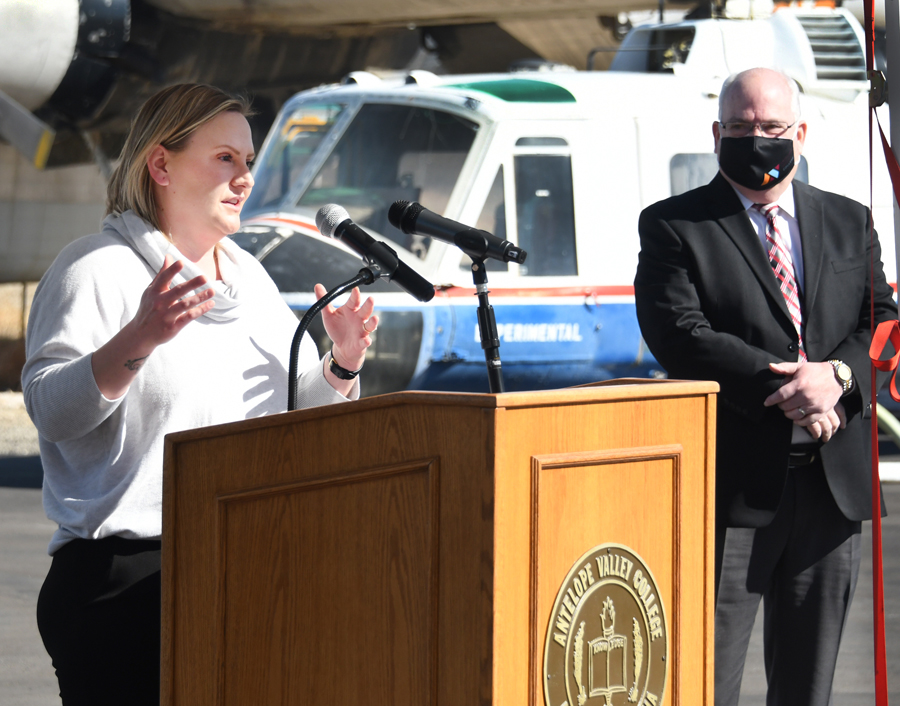
AVC Aeronautics Pioneers
Back in 1986, Frank Roberts, AVC’s now retired dean of technical education, whose resume includes election as a Lancaster council member and mayor, kick-started the college’s new era in aerospace career education.
The following year, while serving as president of the non-profit Milestones of Flight Air Museum at Fox Field, Roberts was instrumental in arranging an AVC lease for the hands-on program. FAA approval came in 1988-1989, and in 1990, Dean of Career and Technical Education Roberts was joined by Jack Halliday, Sr., AERO instructor, and AERO Program Dean of Instruction Maria Clinton, Ph.D., both still serving in the respective roles.
A Timeline for the Aeronautical Technology Program by Betty Sanchez, AVC Executive Director of Marketing and Public Information, reports the first evening track cohort began in 1990 at the leased Milestones of Flight Museum.
The program enjoyed modest growth until just days before Christmas in 1999, SR Technics, a spin-off maintenance and modifications company for Swissair, the Swiss national airline, announced signing a lease on Boeing’s long-vacated Site 9 of Palmdale Regional Airport.
At a news conference at Los Angeles International Airport, officials predicted the company’s new North American headquarters facility would create up 6,000 new jobs for the Antelope Valley, beginning with immediate conversion of DC-10 passenger jets to freight carriers.
In discussions with AVC Dean of Tech Ed Maggie Drake, Swiss Air’s maintenance and modifications contractor sought to relocate the Fox Field facility to the 44,000-square-foot Palmdale structure. AVC added a second morning cohort, hiring faculty member Ty Mettler along with instructional assistant AERO, Patti Browne for the SR Technics plant.
But the SR Technics dream became a nightmare in the aftermath of Sept. 11, 2001, the darkest day in history for airline transportation: The Swiss national airline entered bankruptcy along with SR Technics. The AVC program seemingly had nowhere to go, until a solution was offered by a community-minded businesswoman a few months later.
AERO program officials fondly remember their gratitude when Shouling Barnes, owner of Barnes Aviation at Fox Field, offered to share here fixed base facilities and even her aircraft during AVC’s transition back to Fox.
The Aircraft Fabrication and Assembly Technician Program began in 2002 under CTE Dean Maggie Drake and was initially developed by adjunct faculty member Gary Eisenberg (formally director of training at NGC).
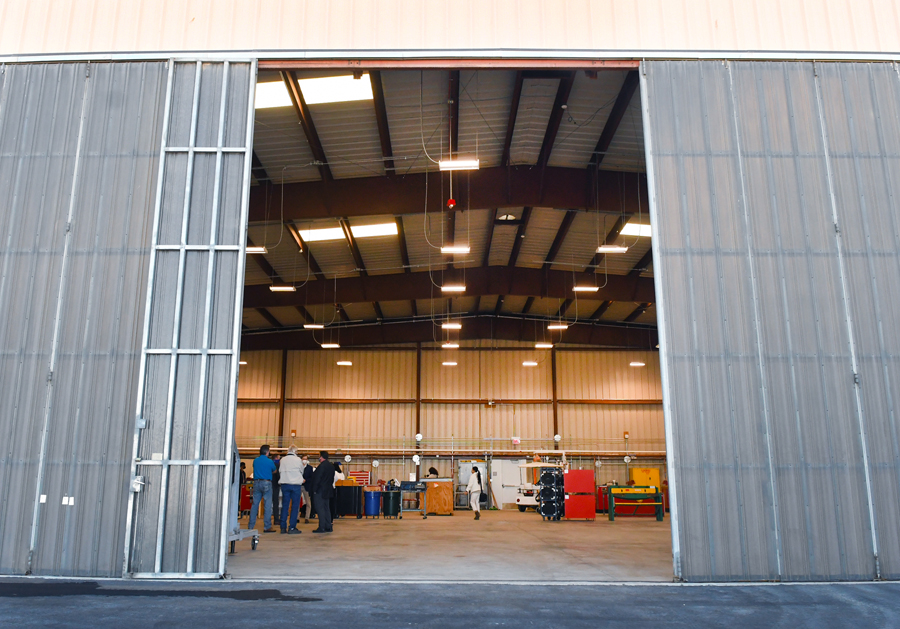
In 2004 Dr. Maria Clinton was hired as the full-time faculty member to oversee the program. Four years later, in a partnership with Northrop Grumman, represented by company training director Orville Dothage, a revised and updated 8-week Rapid Training project began.
By 2015, Northrop Grumman and Dothage again approached the College with an increased need for entry level technicians. In partnership with the city of Palmdale, NGC and others, Clinton more than doubled the training cohort offered in 2008. NGC and other local aerospace companies hired about 98 percent of the program’s students.
After legislation was passed approving a pilot program for community colleges to confer baccalaureate degrees and with the support of the Board of Trustees and college administration, the AFMT Bachelor’s Program began its process in 2015 under the CTE Dean Dr. Karen Cowell and Aeronautical Sciences & Technology Department Chair Dr. Maria Clinton. The program was one of 15 approved by the Chancellor’s Office to offer pilot bachelor programs in the State of California. The first cohort began in Fall 2016.†
Clinton became Interim Dean of the programs in 2019. In the fall of 2020, AFMT program admitted Cohort Five, with the expectation of admitting Cohort Six. Students in the program received promotion and salary increases while attending and graduating from this program.
The programs returned to a new location at Fox Field in 2021.
Coming in the Fall of 2022, at the request of Northrop Grumman, faculty of the Aeronautical Science and Technology Department will introduce four new certificate programs in Advanced Aircraft Structures, Aeronautical Non-Destructive Inspection, Aerospace Leadership and Management and Metrology Sciences for Aerospace Manufacturing Certificate Programs.






